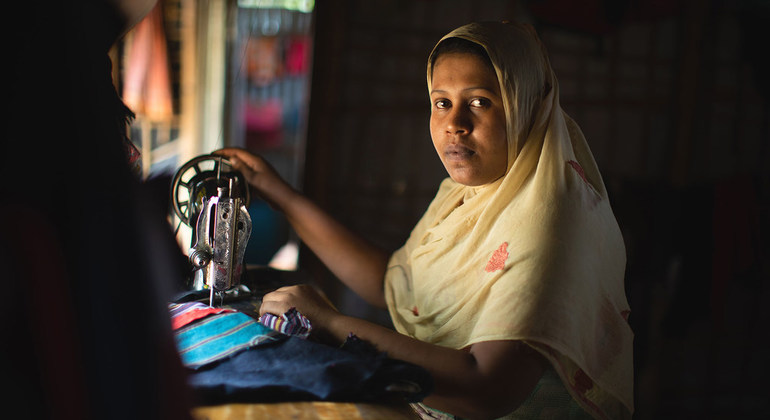Fill teacher training gaps to tackle trauma, psychosocial challenges, urges UN cultural agency on World Refugee Day
On World Refugee Day, the UN Educational, Scientific and Cultural Organization (UNESCO) is calling for more support to fill the gaps in training for teachers on trauma and psychosocial assistance for migrant and refugee students.
A new policy paper launched on Thursday by the agency’s Global Education Monitoring (GEM) Report tackles the educational challenge of trauma, a condition experience by some school-age migrant and refugee children, whose overall number has grown by 26 per cent since 2000.
“Teachers are not, and should never be regarded as mental health specialists, but they can be a crucial source of support for children suffering from trauma if they’re given the right training,” said Manos Antoninis, Director of the GEM Report.
Read more here.
Incessant threat of war, unilateral actions, continue to ‘collectively erode’ Middle East peace prospects, Security Council told
Developments in the Middle East cannot be divorced from Israel’s military occupation of Palestinian territory and settlement-building, or Hamas’ hold over Gaza and its militant activity, a senior United Nations envoy told the Security Council on Thursday, warning that these actions “collectively erode the prospects of a two-State solution”.
“The persistent threat of war; unilateral actions that undermine peace efforts; and severe challenges to the fiscal viability of the Palestinian Authority” also gnaw into the scenario, Nickolay Mladenov, the UN Special Coordinator on the Middle East Peace Process stated.
Read our full story here.
‘First-ever WHO global report on epilepsy highlights care gap in poorer countries
More than seven in 10 people with epilepsy in developing countries are not getting the low-cost care they need, and UN health experts said on Thursday this could lead to a “significantly higher” risk of death among sufferers than in industrialized nations.
According to the first global report on epilepsy from the UN World Health Organization (WHO), this treatment gap exists even though medicines can cost as little as $5 per year, per patient.
In addition to a lack of available medicines to treat sufferers, many poor countries have far too few specialist medical professionals to help.
Find out how in our complete story here.
UN Refugee Agency thanks mayors in scores of cities
On World Refugee Day, the UN refugee agency, UNHCR, thanked mayors across some 50 countries for supporting a global statement of welcome and inclusiveness for families forced to flee.
Part of UNHCR’s year-old Cities #WithRefugees initiative, today some 175 cities have signed on.
“Cities are at the forefront of pioneering new approaches in terms of receiving, including and offering opportunities to refugees,” said UN High Commissioner for Refugees, Filippo Grandi.
“I have great admiration for those mayors, for those local authorities and the people of those cities that are standing in favour of solidarity”, he added.
UNHCR will hold the first-ever Global Refugee Forum in December 2019 to encourage partnerships across sectors that will make a real difference in the lives of refugees and of their host communities.
UN health agency urges political parties to join fight against Ebola
As the World Health Organization (WHO) chief briefed Members States on the situation in the Democratic Republic of the Congo (DRC) on Wednesday, he appealed for funding to bridge the Ebola-response gap.
The DRC’s outbreak will only end with bipartisan political cooperation and community ownership, according to WHO Director-General Tedros Adhanom Ghebreyesus.
After returning from a visit to the country, where he met with leaders from multiple sectors, he elaborated on the health response and flagged that it is facing a severe funding gap.
“After seeing the rapid response in Uganda, I can only urge the international community to continue to support the preparedness activities ongoing there and in neighbouring countries,” he said, observing that concrete investment there has saved lives “by controlling the spread of a dangerous pathogen”.








